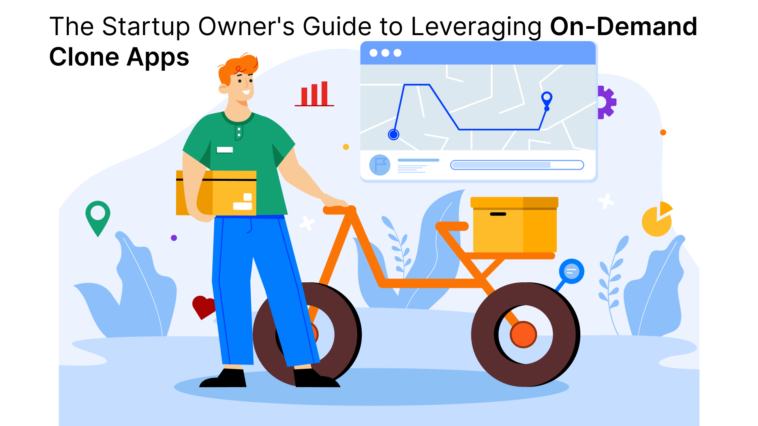Will you launch your startup with a proven business model in 2024? On-demand clone apps might be your golden ticket to success. The on-demand clone app market is revolutionizing how startups enter the digital space. These ready-to-deploy solutions offer a faster, more cost-effective way to launch your business by leveraging pre-built frameworks of successful platforms like Uber, DoorDash, or Instacart. But here’s the real game-changer while traditional app development can take months and drain your resources, clone apps can get you to market in weeks while cutting development costs by up to 60%.
In this comprehensive guide, we’ll explore. On-demand clone apps have revolutionized the way startups approach digital innovation. These apps are essentially replicas of successful platforms like Uber, DoorDash, or Instacart, allowing businesses to leverage proven business models while reducing development complexities.
What Makes Clone Apps Special?
Clone apps serve as pre-built frameworks that mirror the functionality of established platforms. They offer a strategic advantage by providing a tested foundation that can be customized according to specific business requirements. Instead of building everything from scratch, startups can focus on adding unique features and improving user experience.
Benefits for Modern Startups
The appeal of clone apps lies in their practical advantages. They significantly reduce time-to-market, allowing startups to launch their services quickly. The development costs are typically 40-60% lower compared to building custom applications. Plus, these apps come with built-in features that have already been validated in the market.
Core Components and Customization
Every clone app consists of essential elements like user interfaces, backend systems, and administrative panels. While the basic structure remains similar to the original app, startups can customize:
– User interface design and branding
– Feature sets and functionality
– Payment gateway integration
– Analytics and reporting tools
– Security protocols
Market Validation and Success Rate
Clone apps benefit from market-tested concepts. Research shows that businesses using clone apps have a 30% higher success rate in their first year compared to those building from scratch. This is primarily because they’re building upon proven business models that users are already familiar with.
Key TakeawayOn-demand clone apps offer startups a cost-effective, time-efficient solution to enter the digital market by leveraging pre-built frameworks of successful platforms while allowing customization for unique business needs.
Popular On-Demand Clone App Categories
Ride-Hailing Services
The transportation sector leads the on-demand revolution with ride-hailing clone apps. These platforms connect passengers with nearby drivers, offering convenient and reliable transportation solutions. Apps like Uber and Lyft have set the benchmark, making ride-hailing clones particularly attractive for startups entering the mobility market.
Food Delivery Platforms
Food delivery has become an essential service in our fast-paced world. Clone apps modeled after DoorDash, Uber Eats, and Grubhub help restaurants reach more customers while providing convenient dining options. These platforms typically feature real-time order tracking, multiple payment options, and rating systems.
Grocery Delivery Services
The success of Instacart has inspired numerous grocery delivery clone apps. These platforms connect customers with personal shoppers who select and deliver groceries from local stores. The pandemic has significantly boosted this sector, making it an attractive option for entrepreneurs.
Healthcare Services
Telemedicine clone apps, inspired by platforms like Practo and Doctor on Demand, are revolutionizing healthcare access. These apps facilitate virtual consultations, appointment scheduling, and medical record management, making healthcare more accessible and convenient.
Home Services
Following TaskRabbit’s model, home services clone apps connect customers with skilled professionals for various household tasks. From cleaning and repairs to lawn care and pest control, these platforms streamline the process of finding and booking reliable service providers.
Beauty and Wellness
The beauty industry has embraced on-demand services through apps like StyleSeat and Glamsquad clones. These platforms help users book appointments with beauty professionals, ranging from hairstylists to massage therapists, either at home or in salons.
Key TakeawayOn-demand clone apps span diverse sectors from transportation to healthcare, offering startups proven business models and established frameworks to quickly enter lucrative markets with reduced development costs and risks.
Essential Features for Success
Core Features for On-Demand Clone Apps
Building a successful on-demand clone app requires careful consideration of essential features that can make or break your platform. These foundational elements ensure smooth operations and enhanced user satisfaction.
A robust user authentication system forms the backbone of your app’s security. Implement multi-factor authentication and secure login options to protect user data. Real-time tracking capabilities allow users to monitor their orders or services, creating transparency and trust.
Payment integration is another crucial component. Your app should support multiple payment methods, from credit cards to digital wallets, while ensuring secure transactions through encryption and tokenization.
Push notifications keep users engaged and informed about their orders, special offers, and important updates. A rating and review system helps build trust within your community and provides valuable feedback for service improvement.
Advanced Features for Enhanced Performance
To stay competitive in the market, your clone app needs advanced features that elevate the user experience. An AI-powered matching algorithm can efficiently pair customers with service providers, reducing wait times and improving satisfaction.
Analytics and reporting tools provide valuable insights into user behavior, helping you make data-driven decisions. Implement a scalable architecture that can handle increasing user loads without compromising performance.
Include features like in-app chat support and emergency assistance to provide users with immediate help when needed. Geofencing capabilities can help you manage service areas effectively and provide location-based services.
A comprehensive admin dashboard enables you to monitor and manage all aspects of your platform, from user management to payment processing. Regular feature updates and maintenance ensure your app stays current with market demands and user expectations.
Key TakeawaySuccess in the on-demand clone app market depends on implementing both essential and advanced features that prioritize security, user experience, and operational efficiency while maintaining scalability for future growth.
This post was created with our nice and easy submission form. Create your post!





